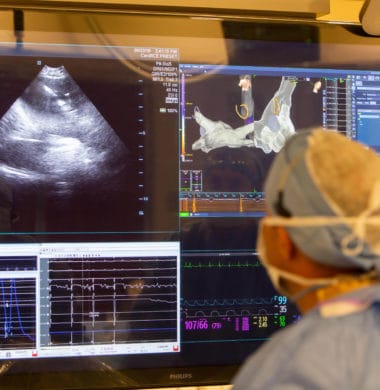When Should I See an Electrophysiologist?

As the medical profession gains an understanding of the complexity of the human body and its problems, we realize that many systems deserve a specialized approach. Few organs are more complicated than the heart, so it makes sense that cardiology, the science of studying and treating the heart, should be divided into subspecialties. This includes electrophysiology.
However, this increasing specialization can cause problems for patients. Many patients don’t know what the different specialties focus on, or how they can help. So let us try to answer questions you might have about electrophysiology so that you know when you might need to see an electrophysiologist.
What Is Electrophysiology?
Electrophysiology (EP) is the study and treatment of the heart’s electrical systems. These electrical systems regulate the heart’s rhythms, ensuring that the different chambers of the heartbeat in the proper sequence and rhythm to adequately deliver oxygenated blood to the body.
The most common test of the heart’s rhythm is an electrocardiogram or EKG. This might be administered by your primary care physician or by an electrophysiologist. An echocardiogram can also help diagnose problems with the rhythm of your heart. However, the most detailed results about your heart and its rhythms come from an electrophysiology study (EPS).
An EPS is a diagnostic test that analyzes the electrical signals in your heart. It helps an electrophysiologist understand why you have developed an irregular heartbeat (also called arrhythmia). In an EPS, doctors will insert a special catheter (thin tube) into your heart. This catheter has a specialized electrode that lets them send electrical signals to your heart. These electrical signals will both stimulate your heart and help to identify problems.
This can help us decide if you need treatment for arrhythmia, and what type of treatment might benefit you.
When to See an Electrophysiologist
You should see an electrophysiologist if your primary care physician has identified an arrhythmia. Types of arrhythmias include:
- Bradycardia—a heart that beats too slowly
- Tachycardia—a heart that beats too fast
- Atrial fibrillation
- Atrial flutter
- Long QT syndrome
- Ventricular fibrillation
- Premature ventricular contraction
Heart arrhythmias can sometimes develop on their own, or they could be related to other medical conditions. They might even be a side effect of medication in some cases.
You should also see an electrophysiologist if you have been recommended to get treatment for a heart arrhythmia, such as:
- Pacemaker
- Implantable cardiac defibrillator (ICD)
- Cardiac ablation
South Denver Cardiology’s expert EP physicians were the first in the state and region to perform cardiac ablations without the use of fluoroscopy x-ray, saving the patient from high doses of radiation.
A pacemaker is a device that sends regular electrical signals to your heart to help it keep in rhythm. On the other hand, an ICD is a device that provides intermittent shocks to your heart when it detects a dangerous pattern of irregular beats. This can help you avoid sudden cardiac death.
An electrophysiologist can also help monitor the success of heart rhythm treatments, which might include medications.
Electrophysiologists and More at South Denver Cardiology
If you are looking for a cardiologist who is interested in promoting your entire health, consider South Denver Cardiology. Although we can provide you with the latest monitoring and interventions in electrophysiology, we can also help you with a wider variety of issues. We offer education and resources that can help you avoid the need for an electrophysiologist.
To learn more about what makes South Denver Cardiology special, or to schedule an appointment with one of our electrophysiologists, please call 303-744-1065 today or use our online form to request an appointment.
- 9 Tips to Reduce Holiday Stress - December 11, 2025
- 6 Tips for Exercising Outdoors with a Heart Condition - May 19, 2025
- Lifestyle Changes That Can Help Manage Arrhythmia - April 30, 2025
Sign Up
As with any health concerns, your specific treatment program should be discussed thoroughly with your primary care physician as well as any specialists who may need to be consulted – like a cardiologist.
Sign Up
